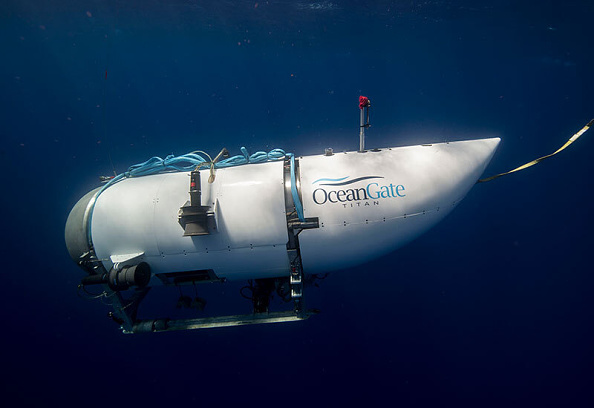What Was Running the Titanic Submersible? It Could Be a $49.99 Videogame Controller
Tech analysts say videogame controllers are often used in other applications
The missing submersible headed for the Titanic shipwreck may have been operated by a wireless video game controller that sells online for $49.99.
Stockton Rush, founder and chief executive of OceanGate Expeditions, which owns the Titan submersible, said in a 2022 segment with CBS News that the vessel was operated by a video game controller.
“We run the whole thing with this game controller,” Rush said during the news segment, holding what appeared to be a modified wireless gamepad made by computer-peripherals company Logitech International.
It’s unclear if OceanGate Expeditions was using a Logitech controller on the Titan when it started its mission on Sunday. A spokesperson for OceanGate declined to comment. Logitech didn’t respond to requests for comment.
The Titan lost contact with the ship monitoring it from the surface one hour and 45 minutes after it began its dive in the North Atlantic on Sunday morning. The Titanic sits about 13,000 feet below the ocean’s surface and about 900 miles off Massachusetts’ Cape Cod.
Rescuers are trying to find the submersible before its oxygen runs out, which officials say could happen Thursday morning. The Titan’s five-member crew includes Rush.
The controller the Titan used in the past appeared to be a modified Logitech F710 gamepad with extended joysticks.
An earlier version of OceanGate’s submersible vessels called the Cyclops was operated by a Sony PlayStation 3 controller, according to a 2014 promotional video released by OceanGate.
The Logitech F710 gamepad was first available in 2010. It’s compatible with computers running on the Windows and ChromeOS operating systems.
Such controllers can be adapted for piloting other machines, as long as the controller and the machine are using the same signal, said Michael Pachter, a managing director at Wedbush Securities.
Game controllers are commonly used in applications beyond video games, said Will McKeon-White, an analyst at technology research firm Forrester. The U.S. military and foreign militaries use them to control vehicles and in other applications because they are fairly intuitive and users often have an existing familiarity with them, he said. The Pentagon didn’t respond to a request for comment.
“The problem with the usage of a Logitech controller here isn’t the fact that a game controller was used,” McKeon-White said. “The issue is they chose a really, really cheap model.”
The military typically expects to have a backup when it uses video game controllers, McKeon-White said. That way “it’s not a situation of ‘your life only relies on a video game controller,’ ” he said.
OceanGate didn’t say if there were backup controlling devices available on the Titan.
Pachter said the Logitech gamepad is considered a durable device made of commonplace parts.
“Every single component of that thing is a commodity component that doesn’t break,” he said, though “they do wear out after a while.”
 Copyright 2020, Dow Jones & Company, Inc. All Rights Reserved Worldwide. LEARN MORE
Copyright 2020, Dow Jones & Company, Inc. All Rights Reserved Worldwide. LEARN MORE
This stylish family home combines a classic palette and finishes with a flexible floorplan
Just 55 minutes from Sydney, make this your creative getaway located in the majestic Hawkesbury region.
As Paris makes its final preparations for the Olympic games, its residents are busy with their own—packing their suitcases, confirming their reservations, and getting out of town.
Worried about the hordes of crowds and overall chaos the Olympics could bring, Parisians are fleeing the city in droves and inundating resort cities around the country. Hotels and holiday rentals in some of France’s most popular vacation destinations—from the French Riviera in the south to the beaches of Normandy in the north—say they are expecting massive crowds this year in advance of the Olympics. The games will run from July 26-Aug. 1.
“It’s already a major holiday season for us, and beyond that, we have the Olympics,” says Stéphane Personeni, general manager of the Lily of the Valley hotel in Saint Tropez. “People began booking early this year.”
Personeni’s hotel typically has no issues filling its rooms each summer—by May of each year, the luxury hotel typically finds itself completely booked out for the months of July and August. But this year, the 53-room hotel began filling up for summer reservations in February.
“We told our regular guests that everything—hotels, apartments, villas—are going to be hard to find this summer,” Personeni says. His neighbours around Saint Tropez say they’re similarly booked up.
As of March, the online marketplace Gens de Confiance (“Trusted People”), saw a 50% increase in reservations from Parisians seeking vacation rentals outside the capital during the Olympics.
Already, August is a popular vacation time for the French. With a minimum of five weeks of vacation mandated by law, many decide to take the entire month off, renting out villas in beachside destinations for longer periods.
But beyond the typical August travel, the Olympics are having a real impact, says Bertille Marchal, a spokesperson for Gens de Confiance.
“We’ve seen nearly three times more reservations for the dates of the Olympics than the following two weeks,” Marchal says. “The increase is definitely linked to the Olympic Games.”

Getty Images
According to the site, the most sought-out vacation destinations are Morbihan and Loire-Atlantique, a seaside region in the northwest; le Var, a coastal area within the southeast of France along the Côte d’Azur; and the island of Corsica in the Mediterranean.
Meanwhile, the Olympics haven’t necessarily been a boon to foreign tourism in the country. Many tourists who might have otherwise come to France are avoiding it this year in favour of other European capitals. In Paris, demand for stays at high-end hotels has collapsed, with bookings down 50% in July compared to last year, according to UMIH Prestige, which represents hotels charging at least €800 ($865) a night for rooms.
Earlier this year, high-end restaurants and concierges said the Olympics might even be an opportunity to score a hard-get-seat at the city’s fine dining.
In the Occitanie region in southwest France, the overall number of reservations this summer hasn’t changed much from last year, says Vincent Gare, president of the regional tourism committee there.
“But looking further at the numbers, we do see an increase in the clientele coming from the Paris region,” Gare told Le Figaro, noting that the increase in reservations has fallen directly on the dates of the Olympic games.
Michel Barré, a retiree living in Paris’s Le Marais neighbourhood, is one of those opting for the beach rather than the opening ceremony. In January, he booked a stay in Normandy for two weeks.
“Even though it’s a major European capital, Paris is still a small city—it’s a massive effort to host all of these events,” Barré says. “The Olympics are going to be a mess.”
More than anything, he just wants some calm after an event-filled summer in Paris, which just before the Olympics experienced the drama of a snap election called by Macron.
“It’s been a hectic summer here,” he says.

AFP via Getty Images
Parisians—Barré included—feel that the city, by over-catering to its tourists, is driving out many residents.
Parts of the Seine—usually one of the most popular summertime hangout spots —have been closed off for weeks as the city installs bleachers and Olympics signage. In certain neighbourhoods, residents will need to scan a QR code with police to access their own apartments. And from the Olympics to Sept. 8, Paris is nearly doubling the price of transit tickets from €2.15 to €4 per ride.
The city’s clear willingness to capitalise on its tourists has motivated some residents to do the same. In March, the number of active Airbnb listings in Paris reached an all-time high as hosts rushed to list their apartments. Listings grew 40% from the same time last year, according to the company.
With their regular clients taking off, Parisian restaurants and merchants are complaining that business is down.
“Are there any Parisians left in Paris?” Alaine Fontaine, president of the restaurant industry association, told the radio station Franceinfo on Sunday. “For the last three weeks, there haven’t been any here.”
Still, for all the talk of those leaving, there are plenty who have decided to stick around.
Jay Swanson, an American expat and YouTuber, can’t imagine leaving during the Olympics—he secured his tickets to see ping pong and volleyball last year. He’s also less concerned about the crowds and road closures than others, having just put together a series of videos explaining how to navigate Paris during the games.
“It’s been 100 years since the Games came to Paris; when else will we get a chance to host the world like this?” Swanson says. “So many Parisians are leaving and tourism is down, so not only will it be quiet but the only people left will be here for a party.”
This stylish family home combines a classic palette and finishes with a flexible floorplan
Just 55 minutes from Sydney, make this your creative getaway located in the majestic Hawkesbury region.






















